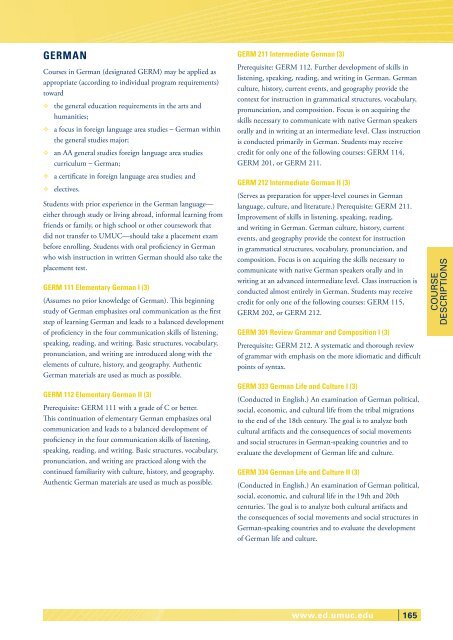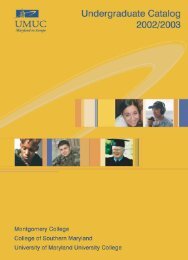Undergraduate Catalog - UMUC Europe
Undergraduate Catalog - UMUC Europe
Undergraduate Catalog - UMUC Europe
Create successful ePaper yourself
Turn your PDF publications into a flip-book with our unique Google optimized e-Paper software.
GERMAN<br />
Courses in German (designated GERM) may be applied as<br />
appropriate (according to individual program requirements)<br />
toward<br />
G the general education requirements in the arts and<br />
humanities;<br />
G a focus in foreign language area studies – German within<br />
the general studies major;<br />
G an AA general studies foreign language area studies<br />
curriculum – German;<br />
G a certificate in foreign language area studies; and<br />
G electives.<br />
Students with prior experience in the German language—<br />
either through study or living abroad, informal learning from<br />
friends or family, or high school or other coursework that<br />
did not transfer to <strong>UMUC</strong>—should take a placement exam<br />
before enrolling. Students with oral proficiency in German<br />
who wish instruction in written German should also take the<br />
placement test.<br />
GERM 111 Elementary German I (3)<br />
(Assumes no prior knowledge of German). This beginning<br />
study of German emphasizes oral communication as the first<br />
step of learning German and leads to a balanced development<br />
of proficiency in the four communication skills of listening,<br />
speaking, reading, and writing. Basic structures, vocabulary,<br />
pronunciation, and writing are introduced along with the<br />
elements of culture, history, and geography. Authentic<br />
German materials are used as much as possible.<br />
GERM 112 Elementary German II (3)<br />
Prerequisite: GERM 111 with a grade of C or better.<br />
This continuation of elementary German emphasizes oral<br />
communication and leads to a balanced development of<br />
proficiency in the four communication skills of listening,<br />
speaking, reading, and writing. Basic structures, vocabulary,<br />
pronunciation, and writing are practiced along with the<br />
continued familiarity with culture, history, and geography.<br />
Authentic German materials are used as much as possible.<br />
GERM 211 Intermediate German (3)<br />
Prerequisite: GERM 112. Further development of skills in<br />
listening, speaking, reading, and writing in German. German<br />
culture, history, current events, and geography provide the<br />
context for instruction in grammatical structures, vocabulary,<br />
pronunciation, and composition. Focus is on acquiring the<br />
skills necessary to communicate with native German speakers<br />
orally and in writing at an intermediate level. Class instruction<br />
is conducted primarily in German. Students may receive<br />
credit for only one of the following courses: GERM 114,<br />
GERM 201, or GERM 211.<br />
GERM 212 Intermediate German II (3)<br />
(Serves as preparation for upper-level courses in German<br />
language, culture, and literature.) Prerequisite: GERM 211.<br />
Improvement of skills in listening, speaking, reading,<br />
and writing in German. German culture, history, current<br />
events, and geography provide the context for instruction<br />
in grammatical structures, vocabulary, pronunciation, and<br />
composition. Focus is on acquiring the skills necessary to<br />
communicate with native German speakers orally and in<br />
writing at an advanced intermediate level. Class instruction is<br />
conducted almost entirely in German. Students may receive<br />
credit for only one of the following courses: GERM 115,<br />
GERM 202, or GERM 212.<br />
GERM 301 Review Grammar and Composition I (3)<br />
Prerequisite: GERM 212. A systematic and thorough review<br />
of grammar with emphasis on the more idiomatic and difficult<br />
points of syntax.<br />
GERM 333 German Life and Culture I (3)<br />
(Conducted in English.) An examination of German political,<br />
social, economic, and cultural life from the tribal migrations<br />
to the end of the 18th century. The goal is to analyze both<br />
cultural artifacts and the consequences of social movements<br />
and social structures in German-speaking countries and to<br />
evaluate the development of German life and culture.<br />
GERM 334 German Life and Culture II (3)<br />
(Conducted in English.) An examination of German political,<br />
social, economic, and cultural life in the 19th and 20th<br />
centuries. The goal is to analyze both cultural artifacts and<br />
the consequences of social movements and social structures in<br />
German-speaking countries and to evaluate the development<br />
of German life and culture.<br />
www.ed.umuc.edu 165<br />
COURSE<br />
DESCRIPTIONS






